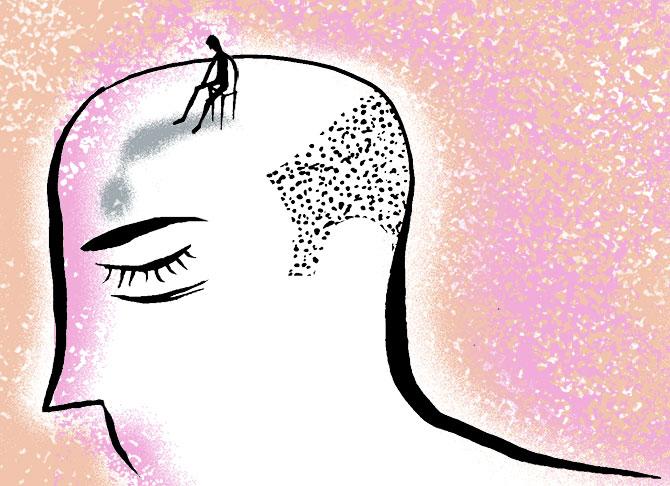'A large number of people are suddenly waking up to the fear of losing jobs,' says Shyamal Majumdar.

For many, it's the fear of the unknown and uncertainty over how long they have to resort to limiting their daily lives.
For others, it's the fear of contracting the coronavirus or worry about how this will affect their financial situation.
There's more. A large number of people are suddenly waking up to the fear of losing jobs after their employers are done with the customary lip service of 'we are in it together' kind of stuff.
And finally, there is the concern about a salary cut.
In a world reeling under COVID-19, there is no denying that the fears are real.
Psychologists say that the COVID-19 crisis has indeed created a combination of economic and financial instability, and there has been a huge disruption of habit and the normal structure of life, leading to a severe effect on people's emotional health.
For example, hoarding and panic buying in grocery shops in the initial days of the lockdown were visible examples of people acting on their fears at the instability and uncertainty they face.
In fact, fear of contamination has become a huge trigger for an almost obsessive compulsive disorder for many people.
The biggest fear, of course, is the effect the pandemic can have on people's mental health.
And it can manifest in several ways.
For example, work from home, which sounded like a bliss in the initial days, is slowly turning out to be a drudgery.
Apart from the fear of an impending non-existence of 'work', people are falling into a pattern of overworking, a sense or feeling that they should be working long hours, to show colleagues and bosses that they are being productive as no one can physically see them working.
When they are working from home and can't get to a call or email right away, the co-workers may wonder if you are taking it easy.
Stress is normal in a person's life.
But what has started affecting many people's mental health (often unknowingly) is that among many global health, economic and societal disruptions, the novel coronavirus has forced millions to physically isolate.
Combined with an unknown future, it can create havoc.
Physical distancing, isolation measures, the closure of schools and workplaces, are particularly challenging, as they affect what we love to do, where we want to be, and who we want to be with, says an official of the World Health Organisation.
In any case, loneliness is one of the world's most significant risk factors.
Now that many people’s freedom of movement is severely limited, the problem has worsened, particularly for older individuals with limited social life.
That is where digital age comes to your aid.
After all, it has never been so easy to stay connected with the people who matter to you the most.
Video calls at least give that illusion of proximity and feel like the person or people you are talking to are nearby.
One way of capitalising on this isolation is to prioritise the things you enjoy doing by yourself, yet haven't had time to dedicate to them.
To come out of this feeling of loneliness, people should utilise this unexpected time to themselves to focus on aspects of their lives that they may not have paid very much attention to before.
One of the advice psychologists are giving is to minimise watching, reading or listening to news about the COVID-19 that causes you to feel anxious or distressed.
Seek information updates at specific times during the day, once or twice.
The sudden and near-constant stream of news reports about an outbreak can cause anyone to feel worried.
It is key to pay special attention to children during this time.
Children are sensitive and when they hear adults speaking about the virus in a very distressed way, they are left feeling nervous, which can lead to long-term negative effects on the child's psyche.
Finally, now that lay-offs and salary cuts are inevitable in a post-COVID-19 world, companies need to be extra careful about the stress it might create.
One way of dealing with this is to be as transparent as possible.
Everybody knows the reason, but wants to be treated with respect and compassion.
After all, how you treat people on their way out of the door does not go unnoticed by the rest of your organisation.
The short point is that fighting and coping with the coronavirus outbreak is not just a physical or medical challenge, but a psychological one as well.












 © 2025
© 2025